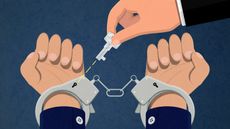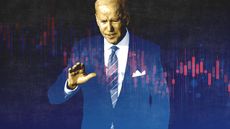Employee benefits in America's gig economy
Everything you need to know, in four paragraphs

Here's everything you need to know, from all perspectives, in four paragraphs:
Are Uber drivers independent contractors or Uber employees? asked James Surowiecki at The New Yorker. For the booming on-demand services industry, "there may be no more important question." Employees are entitled to benefits like health insurance, a minimum wage, 401(k) plans, and sick pay. Contractors get freedom and flexibility, but few protections. Plenty of Silicon Valley startups have reached sky-high valuations thanks to their reliance on contractors, who clean houses, deliver groceries, or ferry you to the airport at the tap of an app. But last month, the California Labor Commission ruled that one of Uber's drivers is, in fact, an employee. The ruling was limited to just one driver, and Uber has vowed to appeal. But similar fights are brewing elsewhere, as more Americans join the gig economy. If other regulators follow California's lead, "it's not just Uber that would be transformed. The U.S. job market would be, too."
Sharing-economy firms like Uber "have always been based on something of a sham," said Michael Hiltzik at the Los Angeles Times. They pretend "that the drivers are working for themselves, not for the bosses." In reality, the company is just ducking its responsibilities, while pocketing most of the proceeds of workers' labor. Yet the answer isn't to force Uber to suddenly employ hundreds of thousands of drivers, said Arun Sundararajan at Financial Times. Such a requirement would inevitably raise costs for consumers and put plenty of startups out of business. It would also rob contractors of the flexibility they crave.
Subscribe to The Week
Escape your echo chamber. Get the facts behind the news, plus analysis from multiple perspectives.

Sign up for The Week's Free Newsletters
From our morning news briefing to a weekly Good News Newsletter, get the best of The Week delivered directly to your inbox.
From our morning news briefing to a weekly Good News Newsletter, get the best of The Week delivered directly to your inbox.
But we're right to be concerned that the sharing economy is leading to greater inequality, with a wealthy upper class "tended to by an on-call and poorly compensated underclass," said Jeff Spross at The Week. So rather than fight a losing battle against changes in the way we work, why don't we "adapt to the new world" and disentangle benefits from the job contract and provide them separately? Our work laws and job-dependent safety-net programs were forged decades ago, "when manufacturing was a big part of the economy and people tended to stay at the same job for life." That era isn't coming back. It's time to update our expectations of "what jobs can deliver."
In the meantime, we could establish a new class of worker, said Alan Hyde at Quartz. Countries like Canada and Sweden already recognize so-called dependent contractors, who are self-employed for some tax purposes but also enjoy basic protections. We could also introduce a system of "microbenefits" that would be prorated and portable, said Felix Salmon at Fusion. Workers could accrue them for any kind of work, even an hour-long gig. "Add them all up, and they would start carrying real heft." This could work a "little like Social Security," but with small amounts of money paid into an account for nonretirement benefits such as unemployment and maternity leave. It's an admittedly tall task. But if we can make it work, "America might well find itself at the forefront of an exciting new chapter in labor economics."
Create an account with the same email registered to your subscription to unlock access.
Sign up for Today's Best Articles in your inbox
A free daily email with the biggest news stories of the day – and the best features from TheWeek.com
-
 Ottawa climate talks: can global plastic problem be solved?
Ottawa climate talks: can global plastic problem be solved?In the spotlight Nations aim to draft world's first treaty on plastic pollution, but resistance from oil- and gas-producing countries could limit scope
By Harriet Marsden, The Week UK Published
-
 Netherlands split on WFH for sex workers
Netherlands split on WFH for sex workersSpeed Read Councils concerned over 'nuisance' of at-home sex work, but others say changes will curb underground sex trade
By Arion McNicoll, The Week UK Published
-
 'He adored Trump, and then rejected him'
'He adored Trump, and then rejected him'Today's Newspapers A roundup of the headlines from the US front pages
By The Week Staff Published
-
 The pros and cons of noncompete agreements
The pros and cons of noncompete agreementsThe Explainer The FTC wants to ban companies from binding their employees with noncompete agreements. Who would this benefit, and who would it hurt?
By Peter Weber Published
-
 What experts are saying about the economy's surprise contraction
What experts are saying about the economy's surprise contractionThe Explainer The sharpest opinions on the debate from around the web
By Brendan Morrow Published
-
 The death of cities was greatly exaggerated
The death of cities was greatly exaggeratedThe Explainer Why the pandemic predictions about urban flight were wrong
By David Faris Published
-
 The housing crisis is here
The housing crisis is hereThe Explainer As the pandemic takes its toll, renters face eviction even as buyers are bidding higher
By The Week Staff Published
-
 How to be an ally to marginalized coworkers
How to be an ally to marginalized coworkersThe Explainer Show up for your colleagues by showing that you see them and their struggles
By Tonya Russell Published
-
 What the stock market knows
What the stock market knowsThe Explainer Publicly traded companies are going to wallop small businesses
By Noah Millman Published
-
 Can the government save small businesses?
Can the government save small businesses?The Explainer Many are fighting for a fair share of the coronavirus rescue package
By The Week Staff Published
-
 How the oil crash could turn into a much bigger economic shock
How the oil crash could turn into a much bigger economic shockThe Explainer This could be a huge problem for the entire economy
By Jeff Spross Published